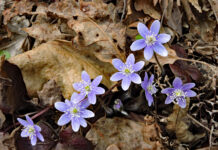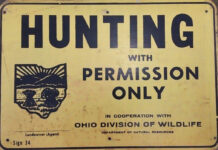To me, it was a familiar conversation, but to most of the folks at this particular social gathering, it was not. Somehow, a discussion had turned to a guest’s hobby of hunting. He mentioned that he sometimes experienced a nearly spiritual feeling during his outings.
One couple smiled curiously while waiting for the punchline while another person condescendingly commented that killing must do “that” for “some” people. The gentleman had found himself in what I’m sure felt like an indefensible and undefinable position.
The group turned to me, the acknowledged and experienced game warden. I think they wanted stories about busting slob hunters or some humorous anecdote — a counter to his seemingly nonsensical comment. I could have done either, as more than 35 years of working in the field supplied plenty of slapstick-style material.
I didn’t bother to try to offer excuses for killing game and fish; I’ve seen it done in plenty of different circumstances, and I enjoy hunting and fishing myself. I’ve also arrested poachers whose only care was killing with no ethical regulator. In contrast, I especially remember one guy tearing up as he scratched an old spaniel’s ears during their last hunt together.
As I remembered that man’s tears from a few years ago, I faced the group and explained my version of what that guy may have meant.
This fellow was having trouble finding the words to explain that he’d found a world that isn’t made up of concrete and cars, a world that recognizes that the human species is more than a bystander walking a garden path or grocery store aisle.
Since I was asked, I offered my opinions and observations. Hunters and anglers begin their sporting adventures for a variety of reasons. Some start early in life while following a parent, relative or family friend. Others take up the rod or gun by invitation or curiosity. A few want to try something new or to stray from a particular stereotype. I believe they encounter four phases during their sporting development.
Phase 1
A new sport wants to be successful and grades the entire experience on whether they’ve bagged their quarry. They’re the ones most likely to post pictures of their success on every available social media and burn up their friend’s cell phones before ever getting out of the woods or off the lake.
Phase 2
This one has experienced success in the past and is now looking to bag the most allowed by law. I call this one “The Provider.” He’ll have goose jerky, venison chili or squirrel stew ready to share with anyone willing and can single-handedly host a fish fry at the local club.
They’ll hunt dusk to dawn in a thunderstorm and bravely fish in sea-sickening waves to try and finish out any limits. This person needs a bigger freezer — or two — and they sometimes dream of writing a wild game cook book.
Phase 3
Folks in this category have read the book, seen the movie, done the scouting and gotten the T-shirt. They practice their skills and have developed a keen sense of knowing the hows, whens, whats and wheres. They want the trophy of a lifetime every year. Their screensavers are self-portraits with big bucks, turkeys or fish, although children may be used as a prop.
Their pickup will be adorned with stickers from hunting and fishing manufacturers and conservation clubs, and they name their dogs Ruger, Trapper, Arrow, Gunner, Ranger or Hunter. Don’t be surprised to hear them address one of their kids by a similar name.
There’s absolutely nothing wrong with any of these categories. The vast majority stay within laws and respect wildlife and the ideals of conservation. Each is gaining experience and growing. Some will never leave a particular phase while others progress quickly. You find them at conservation clubs, Pheasants Forever events, Trout Unlimited projects, Black Swamp Bucks banquets and sitting in church pews.
Thankfully, only a few will allow greed to enter the chase. Fortunately, those that do also come to develop a “you can’t catch me” attitude and will eventually get to meet some game warden. The good folks roaming the woodlots and lakes relish that get-together and usually lament the meager fines too often handed out by the courts.
Phase 4
Then there’s Phase 4 — the final chapter. While the kill or the catch is still the goal, they’ve discovered the secret … they now know their place. They have come to realize that they are at the pinnacle of predators but they have something no other predator possess — a conscience, a knowledge of right and wrong, and they embrace it.
These folks judge their trips not by creel content or antler points but by the totality of their experience. They’re the ones that suddenly choose to hunt with grandpa’s old double or go back to a little creek that they haven’t fished since high school.
Many have lugged the hallowed remains of a faithful bird dog to a secret grouse covert and left with a tearful vow to someday hunt with them again. They’re the ones that teach the kid next door to tie a woolly bugger or volunteer at youth hunts. They usually have a favorite hat and travel with a favorite dog. They also seem to like to plant trees.
With all of this comes an understanding of each animal’s role in simple, daily survival. They recognize life as both limited and limitless and an acknowledgment of something greater. They realize that they are not apart from nature, but a part of it.
They understand that you can’t take without giving — and they’re the most likely to get stuck at a party and to be asked to explain why they hunt or fish, and they stand there, unable to put “love” into words. You know, I sure miss that old spaniel.
“Nature is not a place to visit.
It is home.”
— Gary Snyder












